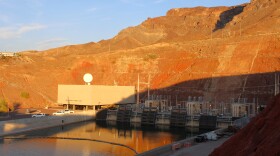-
Ted Cooke had been tapped to run the Bureau of Reclamation, but withdrew as some Upper Basin states worried about potential bias.
-
The move, by the Colorado River Indian Tribes in Arizona and California would give rights of nature to the water, marking a historic first.
-
Amid a prolonged megadrought, the Bureau of Reclamation is predicting that Lake Powell may drop close to a “dead pool." But, water managers won’t let that happen. They’ll first tap into reservoirs further upstream – including in New Mexico.
-
Drought conditions in the Rocky Mountains could further lower water levels at Lake Powell.
-
Funding from the Inflation Reduction Act was allocated to conserve water and protect habitat, but President Trump's executive order put that spending on pause.
-
A program in Utah is paying farmers to make their irrigation equipment more efficient, but researchers say it may not be saving as much water as it appears.
-
Disagreement, bickering, and uncertainty defined 2024 for the Southwest's shrinking water supply.
-
Engineering hurdles, high costs and political challenges stand in the way of an easy fix to the West's water shortages. This is Part 1 in the Western Water Myths five-part series.
-
Negotiations over the water supply for 40 million people are hinged on how you interpret the words "will not cause," written into the century-old Colorado River Compact.
-
Cities around Phoenix are spending billions to develop water infrastructure. Local leaders say it's a necessary step as the Colorado River shrinks and groundwater dries up.
Play Live Radio
Next Up:
0:00
0:00
Available On Air Stations








